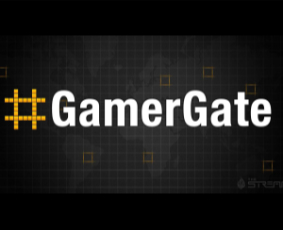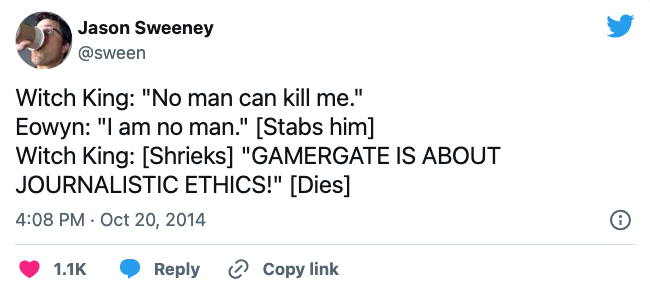This post originally appeared at my secret level just drafts.
I transferred it to this place because my secret level now focuses more strictly on game-based learning, education, and LLM/GPT/AI.
#GamerGate isn’t over. Actually, GamerGate might never be over. Or at least won’t be for a very long time. And it can’t, because institutionalized misogyny—very much like its sibling institutionalized racism the consequences of which are as visible and as lethal as ever—is, indeed, about institutions and institutionalized practices. GamerGate is not about “issues.” Neither legitimate issues nor pseudo issues—instead, the whole GamerGate edifice is built upon maintaining systemic privilege within our predominant power structures, structures that are completely transparent and therefore invisible for those who enjoy these privileges, but starkly reflecting and often painfully visible for those who don’t.
This asymmetry, in turn, engenders very different flavors of “ideology,” which complicates things considerably.
Everything that’s enmeshed in these transparent, invisible power structures will be perceived by those endowed with privilege as “natural”—race relations, gender relations, how we are educated, how we work, how we love, how we fight, how we die. In contrast, every voice that tries to question or change these invisible power structures—toward visibility, respect, equal opportunity, whatever it is—will be instantly “marked” and highly visible and therefore inevitably be perceived as “ideological” against an otherwise “natural” background, much like a cloud on a spotless, blue sky.
This perceived naturalness, however, is a kind of “deep ideology”—I’m loosely following Michel Foucault here, and Judith Butler—which is glaringly obvious as such for the non-privileged and disenfranchised. And this “deep ideology” in turn—now loosely following Niklas Luhmann here (I told you it’ll complicate things!)—serves recursively as both cause and effect with respect to the underlying power structures in that autopoietic system (i.e, a system where the functional product of its cooperating parts is the organization that creates these parts) we call “society.”
So if you enjoy white, straight, male, cis, able-bodied, or mentally unimpaired privilege, you need to develop a “systemic awareness” which lowers the transparency and makes the invisible visible, and then we’all might be able to actually talk. It’s certainly not easy to develop this awareness all by yourself from scratch, but you don’t need to—there are people who walk amongst you who, if you ask in good faith, are sincerely willing to help! So especially if you’re a straight white dude who prefers to remain ignorant about the relative privileges you enjoy, and there is always a point where remaining ignorant becomes an active decision indeed, pardon me that henceforth your name will be known as Douchebag.
Let’s translate all this into gaming terms. John Scalzi once put it like this: for the privileged, life is like playing an MMORPG on the lowest difficulty setting and remaining blissfully unaware of it.
Still too abstract? Here then, let me help you out with this one:
“25 Invisible Benefits of Gaming While Male” by Feminist Frequency
That’s why GamerGate is not an “issue” we can “solve”—it’s a systemic problem we’re confronted with every day on countless occasions. Systemic problems take many forms, in the games industry and society at large as well. Whether, in the case of misogyny, it’s death, rape, and terror threats against female developers and critics and cosplayers and every female voice that’s raised in traditionally male-dominated contexts, whether, in the case of racism, it’s the constant terror you experience as a person of color even if you’re not getting shot six times with your hands up and unarmed or strangled to death on camera by law enforcement officers who act with impunity. Systemic problems have many faces, and they’re usually much uglier than you think they are.
And that brings me to Cultural Criticism, the very purpose of which is to lower the system’s transparency, to denaturalize what appears natural, to make the invisible visible, to expose structural privilege. What Anita Sarkeesian does is cultural criticism, and the mind-boggling amount of threats and invectives directed at her from within the “gaming community,” enriched with massive amounts of hate-filled misogyny and a generous helping of antisemitism, was—and is—terrifying. If you’ve followed her Twitter mentions—or those from Leigh Alexander or Brianna Wu—you couldn’t but stare in utter disbelief at the misogynist hordes that popped out of the ground like spawned from dragon’s teeth. And for all of us who self-identified as male “gamers” up to this point in time, in a way this also meant that, suddenly, these misogynist hordes were us.
But not only “us gamers”—from early on, I noticed many familiar names from the “atheist community” joining GamerGate’s ranks—actually, the same assholes who want to keep atheism “pure” without contaminating it with social issues, who hurl Social Justice Warrior at you as an insult, and who call cultural critics pointing at their straight white male privileges “bullies.” Sounds familiar? Exactly.
And it’s the same familiar idiots who accuse you of misandry—“How does being a misandrist make you better than a misogynist?” blah blah—while a) taking ironic misandry literally (taking things literally where you shouldn’t is a well-oiled rhetorical ploy) and b) pretending to not see that all this is not at all about individual likes and dislikes, but about a huge systemic imbalance where misogyny is baked right into the distribution and availability of resources while misandry is not. In society, “misandry” does not wield any perceptible power, and it’s a non-issue if there ever was one. But, as a reminder, misogyny isn’t an “issue” either—it’s part of the systemic problem I outlined above, and these kinds of problems are not solvable without changing the underlying structure, sometimes wholesale.
Now Ethics in Journalism, in contrast, is indeed an “issue.” And that’s why GamerGate supporters are profoundly disinterested in it at the end of the day. Does anybody really have to point out the great number of problems endemic to video game journalism? I think not. These problems have been bugging us for years and years and not a week goes by without something happening that reminds us. Since when, then, are Ethics in Video Game Journalism’s biggest problems female indie developers working or not working on Call of Duty clones and/or having a video game journalist boyfriend who never wrote a single line about her games, or Kickstarter-backed female critics, or Patreon-supported female artists?
Are these really our problems in video game journalism?
Witch King: “No man can kill me.”
Eowyn: “I am no man.” [Stabs him] Witch King: [Shrieks] “GAMERGATE IS ABOUT JOURNALISTIC ETHICS!” [Dies] @sween 4:08 PM – 20 Oct 2014
But! wouldn’t it be possible, however remotely, that GamerGate—which, to remind you, was kicked from 4chan, of all places; whose merry members laughed it off when confronted with their endemic combination of death threats and doxxing because “nobody’s been killed yet!”; and whose leading figures are really quite endearing characters—be rescued by funneling it into the collecting tank of their own pretense, into a true consumer movement?
No. Here’s why:
The entire movement is like dragging a net through sewage, picking up every vile sexist/homophobic consumer. It’s unsalvageable.
@Spacekatgal 4:21 PM – 15 Nov 2014
GamerGate is about as salvageable as the MRA camp or those who take their political and aesthetic inspirations from tinfoil agendas and Stürmer illustrations. Talking of which: it was breathtaking to see how GamerGate acolytes shamelessly deployed Nazi imagery, especially against Anita Sarkeesian, while at the same time insulting feminists as “femiNazis” on a regular basis, all without the slightest cognitive dissonance. But there’s more—and this is a feeling I truly share with Elizabeth Simins: despite many holocaust comparisons floating around, it was GamerGate’s illustrated self-image (in several variations) of intrepidly resisting the “media conspiracy” tanks on Tiananmen Square that really knocked me off my feet.
Finally, are there “two sides” to this story? Well, yes—in the very sense that there are “two sides” to the story when it comes to the dangers of tobacco use or to climate change. Exactly like in the latter cases, GamerGate’s spin is a true “manufactroversy,” a manufactured controversy.
Which this tweet illustrates best:
Should women be allowed to create and play video games without fear of being murdered in real life? Let’s hear both sides of the story.
@Hello_Tailor 5:12 AM – 15 Oct 2014
And yes of course that tweet is sarcastic, bitterly so. But at that point things had literally advanced to a state where at least some people were confused enough and read and reacted to it literally.
Which raises the question: if #GamerGate isn’t over, might never be over, or at least won’t be for a very long time because it isn’t about “issues” but about invisible systemic privilege, what should we be doing next?
Well—I think we should keep our defenses up, collectively protect vulnerable colleagues and friends, and strike back swiftly and decisively if need be, but we should not let this toxic masculinity-fueled GamerGate nonsense eat up our time and energy any longer. Instead, let’s put our time and energy into more valuable endeavors that might, in the long run, make a difference.
For us, actually, now is a better time than ever for developing great games that can make a difference.
Addendum:
A “#GamerGate Isn’t Over But” Addendum linked-list item on my secret level just drafts.
If you have something valuable to add or some interesting point to discuss, I’ll be looking forward to meeting you at Mastodon!




